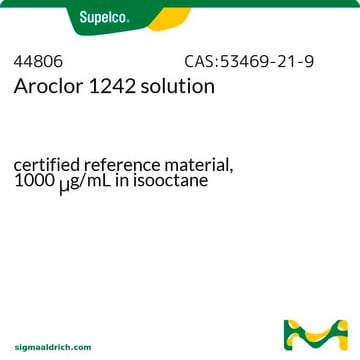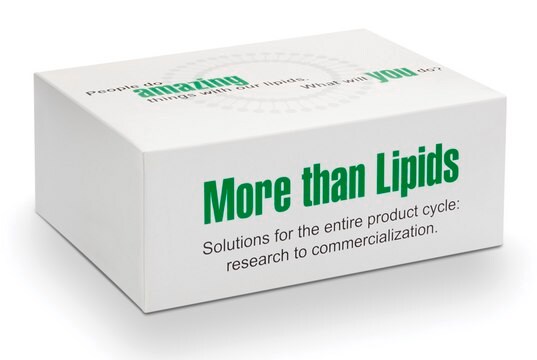850144P
Avanti
18:0-20:4 PI
Avanti Research™ - A Croda Brand
Synonym(s):
1-octadecanoyl-2-(5Z,8Z,11Z,14Z-eicosatetraenoyl)-sn-glycero-3-phospho-(1′-myo-inositol) (ammonium salt); SAPI; PI(18:0/20:4(5Z,8Z,11Z,14Z)); 110661
About This Item
Recommended Products
description
1-stearoyl-2-arachidonoyl-sn-glycero-3-phosphoinositol (ammonium salt)
Assay
>99% (TLC)
form
powder
packaging
pkg of 1 × 100 μg (with stopper and crimp cap (850144P-100ug))
pkg of 1 × 500 μg (with stopper and crimp cap (850144P-500ug))
manufacturer/tradename
Avanti Research™ - A Croda Brand
lipid type
cardiolipins
phospholipids
shipped in
dry ice
storage temp.
−20°C
SMILES string
O[C@H]1[C@@H]([C@H](O)[C@H](O)[C@@H](O)[C@@H]1O)OP(OC[C@H](OC([C19H31])=O)COC(CCCCCCCCCCCCCCCCC)=O)([O-])=O.[NH4+]
General description
Application
- as a negative control to evaluate the specificity of the interaction between cholesterol sulfate and receptor Mincle by surface plasmon resonance (SPR) experiment
- as a test lipid in liposomes harboring candidate triggering receptor expressed on myeloid cells 2 (TREM2) ligands, to assess TREM2 stimulation
- as a reference in liquid chromatography tandem mass spectrometry (LC-MS/MS) analysis to identify PI(18:0/20:4) in cancer tissue-originated spheroids (CTOSs) extraction
Packaging
Legal Information
also commonly purchased with this product
Storage Class Code
11 - Combustible Solids
Choose from one of the most recent versions:
Certificates of Analysis (COA)
Sorry, we don't have COAs for this product available online at this time.
If you need assistance, please contact Customer Support.
Already Own This Product?
Find documentation for the products that you have recently purchased in the Document Library.
Customers Also Viewed
Our team of scientists has experience in all areas of research including Life Science, Material Science, Chemical Synthesis, Chromatography, Analytical and many others.
Contact Technical Service












